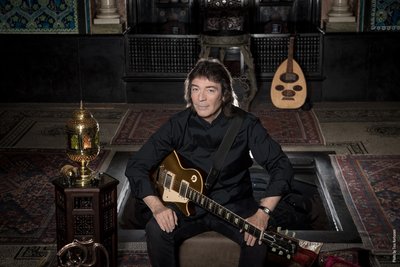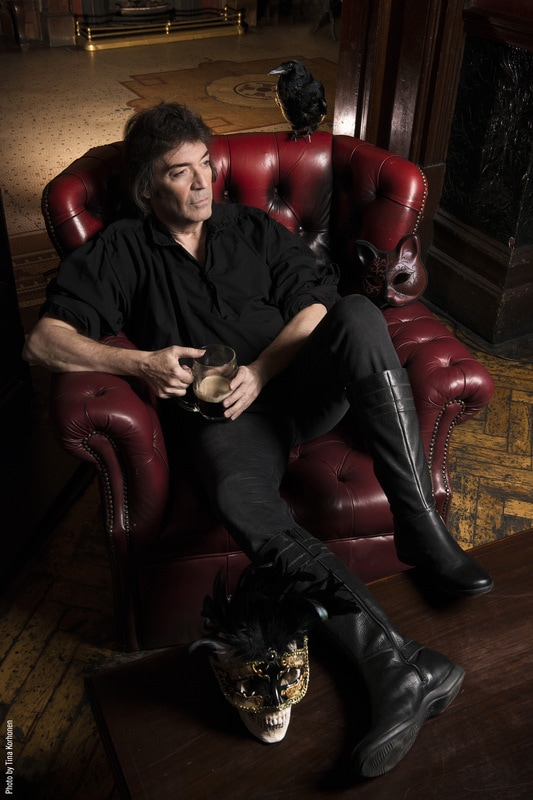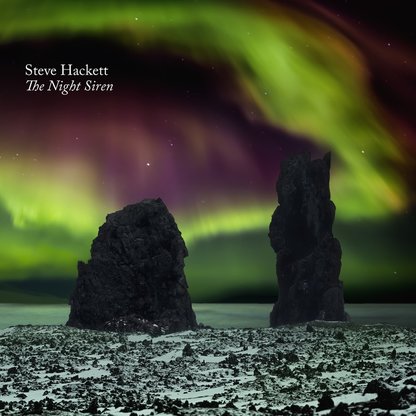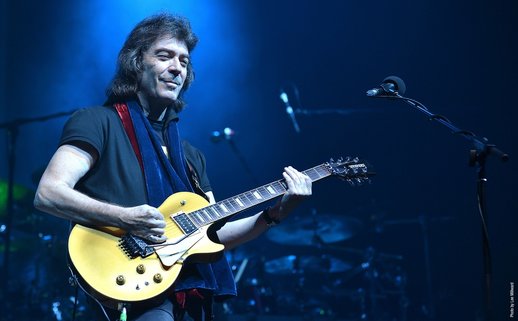Interview
Steve Hackett
chats to Kim Tobin ahead of the launch of his new album, The Night Siren and his stop off at the Cliffs Pavilion, Southend-on-Sea on 10th May with his Genesis Revisited with Hackett Classics Tour
Steve Hackett
chats to Kim Tobin ahead of the launch of his new album, The Night Siren and his stop off at the Cliffs Pavilion, Southend-on-Sea on 10th May with his Genesis Revisited with Hackett Classics Tour
I am under strict instructions from Steve Hackett’s PR people, that as he has been very busy all day doing interviews to promote his forthcoming album, ‘The Night Siren’ (out on 24th March) and tour, he can only give me 15 minutes for my interview. It’s nearly 4pm when I do get to speak to him and he’s been at it all day, so I’m really not expecting much but to my surprise, when I look up at the clock after I put the phone down, I see that we’ve been chatting for a full 30 minutes.
Having already begun the Genesis Revisited with Hackett Classics Tour in the US and Canada, I ask Steve, 67, how well the new songs from the album have been received by the fans over there.
“Well, they seem to like the new stuff, which is good,” he tells me. “I did a mixture of both the new album and old stuff - and very old stuff. We got to do some Genesis stuff from Wind & Wuthering, celebrating its 40th birthday. In Buffalo, we worked with the Buffalo Philharmonic Orchestra, so it’s been a really good tour, really good. I’m really happy with the way it went.”
I suggest that it must be quite daunting playing new songs to fans and waiting for a reaction. Steve agrees, “That’s right, but the new stuff seemed to go down very well. There’s something about it that seems to work well with audiences. I think it’s quite aggressive - the new stuff, and it seems to be designed for live work.” He seems surprised about this, admitting, “I didn’t design it for live because I never design anything for live, I just think, ‘Oh I’ll do this and if we can do a decent version of it live, perhaps we will,’ but that’s not normally the first consideration. I just try and do a record that works for me.”
'The Night Siren' might be Steve Hackett’s 25th solo studio album in a distinguished and lengthy career, but it offers ample evidence of this talented man's desire to push himself and his visions to fresh heights. Having had a preview of the album before my chat with Steve, I tell him that I really enjoyed listening to some of the great melodies on there and that I particularly enjoyed, The Other Side of the Wall, a really beautiful song. He responds, “I’m glad you like that.” Written with his wife Jo, he goes on to explain how the song came to fruition.
“We were in a park that was attached to a hotel and we went for a walk and saw a walled up gateway and Jo was intrigued by that. We kind of wrote an imaginary story that went with that and that's why you have that very romantic feeling from the song. The second part of the song was a story unfolding with one couple in the present day and another couple in spirit, who in their own lifetime never got a chance to be together. So yeah, it’s a mixture of these two people or really four people. It’s very romantic and I hate to use the word escapist but I can’t think of another one.”
“Isn’t that what people want though, when they listen to music,” I venture, “the chance to escape…”
Steve finishes my sentence, “…into something, into the story?” Explaining more about the song’s composition he goes on, “Normally I think I would have used lots of different singers on a track like that but I ended up doing all the harmonies myself. I tried to sound like different singers, different perspectives, different places but the harmonies are what drove it in a way.”
Having already begun the Genesis Revisited with Hackett Classics Tour in the US and Canada, I ask Steve, 67, how well the new songs from the album have been received by the fans over there.
“Well, they seem to like the new stuff, which is good,” he tells me. “I did a mixture of both the new album and old stuff - and very old stuff. We got to do some Genesis stuff from Wind & Wuthering, celebrating its 40th birthday. In Buffalo, we worked with the Buffalo Philharmonic Orchestra, so it’s been a really good tour, really good. I’m really happy with the way it went.”
I suggest that it must be quite daunting playing new songs to fans and waiting for a reaction. Steve agrees, “That’s right, but the new stuff seemed to go down very well. There’s something about it that seems to work well with audiences. I think it’s quite aggressive - the new stuff, and it seems to be designed for live work.” He seems surprised about this, admitting, “I didn’t design it for live because I never design anything for live, I just think, ‘Oh I’ll do this and if we can do a decent version of it live, perhaps we will,’ but that’s not normally the first consideration. I just try and do a record that works for me.”
'The Night Siren' might be Steve Hackett’s 25th solo studio album in a distinguished and lengthy career, but it offers ample evidence of this talented man's desire to push himself and his visions to fresh heights. Having had a preview of the album before my chat with Steve, I tell him that I really enjoyed listening to some of the great melodies on there and that I particularly enjoyed, The Other Side of the Wall, a really beautiful song. He responds, “I’m glad you like that.” Written with his wife Jo, he goes on to explain how the song came to fruition.
“We were in a park that was attached to a hotel and we went for a walk and saw a walled up gateway and Jo was intrigued by that. We kind of wrote an imaginary story that went with that and that's why you have that very romantic feeling from the song. The second part of the song was a story unfolding with one couple in the present day and another couple in spirit, who in their own lifetime never got a chance to be together. So yeah, it’s a mixture of these two people or really four people. It’s very romantic and I hate to use the word escapist but I can’t think of another one.”
“Isn’t that what people want though, when they listen to music,” I venture, “the chance to escape…”
Steve finishes my sentence, “…into something, into the story?” Explaining more about the song’s composition he goes on, “Normally I think I would have used lots of different singers on a track like that but I ended up doing all the harmonies myself. I tried to sound like different singers, different perspectives, different places but the harmonies are what drove it in a way.”
|
'The Night Siren' is not only thematically Hackett's riposte to those who believe the world is unavailingly enveloped in negativity, but in practical terms he has also taken a unifyingly global path. Listening to the album, you can hear a huge amount of influences running through it, one assumes from the various countries that Hackett and his wife, Jo, have visited during the album’s conception. For someone who’s such an accomplished musician as Hackett is, I wonder whether any of the musicians he collaborated with on the album taught him anything he didn’t already know. “Ooh, I think lots, yeah,” comes his reply. “There’s 20 people on the album from all around the world - from Azerbaijan to Hungary, Israel and Palestine; between the United States and the UK and there’s instruments from different parts of the world. Some Peruvian instruments and stuff that we found when we went to the Andes and Machu Picchu. But the upshot was, we came away with some instruments. So we’ve got, for instance, an instrument called the charango, a little stringed instrument, that we used on the same track with another small stringed instrument from Azerbaijan, in that case it was a guy called Malik Mansurov who was playing a tar; so we put those two instruments together to have a little acoustic section.” He pauses for a second, “I doubt that anyone’s ever played that combination of instruments before together!” He laughs, “Or you never know, there might be some folk troupe somewhere.” He adds, contemplatively, “But the fact that they were sympathetic to each other - those two instruments…” |
Hackett, it has to be said, is clearly passionate about this new album, as he goes on to explain more, “It’s a big adventure all of that; on the track Inca Terra it starts off with small instruments and then ends up with an orchestra on the end of it. I like things that can start small and get bigger. I think crescendos work well with music. It also works well live. I haven’t played that one live yet but maybe one day I will. It goes through a lot of changes, a lot of sort of jungly type things. We’ve got the charango and the tar on the very first track so they work well together on that one. There’s a lot of different styles, a lot of different types of music, the idea of unity.”
There are very definite Spanish Flamenco, Greek and Middle Eastern influences on the album and Hackett agrees, “Yes, all of those things, you’ve obviously been listening to it very closely.”
Bagpipes too. “Bagpipes, yes, we’ve got some Uilleann pipes playing on it. That’s Troy Donockley playing the pipes at the end of In Another Life, the Scottish track, and sounding extraordinary.”
In Another Life is also a song with a great story to it. Hackett tells me, “It’s about injustice. The idea of a man whose family has been wiped out by the English; and in a way it’s a kind of microcosm of Scotland’s troubled history. It’s a guy who decides to go on a rampage and fight for a clan of one. A man who would normally be pacifist but even though he knows that he’s going to die at the end of it, he’s going to do everything he can to right the wrongs that he’s been subjected to - him and his family. So it’s got quite a spiritual implication as well.”
I ask him whether this was a story that had been told to him or if it came purely from his own imagination, to which he replies, “It’s a made up story but there are many stories like that. When Scotland was subject to the tyranny of the English. I’m imagining how I might have behaved myself under similar circumstances - we’ll never know - but there’s a man who’s thinking he’s going to fight for something, other than the things he can achieve in this lifetime. He can’t be pacifist anymore which is why there’s the lines “unearth the sword I forswore to use”. I tried to clothe it in as much old language as I could and towards the end of it, “drowned by an English hand in yon’ riverbed if fate wills,” that kind of stuff. So yes, it’s basically a modern folk song and then this song goes through changes, where in order to show the energy and anger it goes electric, it becomes rock guitar and the playout has the more ancient instruments as it takes on a kind of nostalgic feeling.”
There are very definite Spanish Flamenco, Greek and Middle Eastern influences on the album and Hackett agrees, “Yes, all of those things, you’ve obviously been listening to it very closely.”
Bagpipes too. “Bagpipes, yes, we’ve got some Uilleann pipes playing on it. That’s Troy Donockley playing the pipes at the end of In Another Life, the Scottish track, and sounding extraordinary.”
In Another Life is also a song with a great story to it. Hackett tells me, “It’s about injustice. The idea of a man whose family has been wiped out by the English; and in a way it’s a kind of microcosm of Scotland’s troubled history. It’s a guy who decides to go on a rampage and fight for a clan of one. A man who would normally be pacifist but even though he knows that he’s going to die at the end of it, he’s going to do everything he can to right the wrongs that he’s been subjected to - him and his family. So it’s got quite a spiritual implication as well.”
I ask him whether this was a story that had been told to him or if it came purely from his own imagination, to which he replies, “It’s a made up story but there are many stories like that. When Scotland was subject to the tyranny of the English. I’m imagining how I might have behaved myself under similar circumstances - we’ll never know - but there’s a man who’s thinking he’s going to fight for something, other than the things he can achieve in this lifetime. He can’t be pacifist anymore which is why there’s the lines “unearth the sword I forswore to use”. I tried to clothe it in as much old language as I could and towards the end of it, “drowned by an English hand in yon’ riverbed if fate wills,” that kind of stuff. So yes, it’s basically a modern folk song and then this song goes through changes, where in order to show the energy and anger it goes electric, it becomes rock guitar and the playout has the more ancient instruments as it takes on a kind of nostalgic feeling.”
Changing tack a little, I ask Steve if he would ever lend his music towards writing film scores, especially in light of the fact that his wife has been involved in film, theatre and writing.
“I’ve had things used for film but I don’t usually get hired to do it. People tend to pick up and use things that I’ve done, particularly with the Spectral Mornings album from many years ago. The BBC used it rather a lot at the time.”
“So, yeah, I’m interested in the marriage of film and music but in the meanwhile, until Mr De Mille gives me a call….I’m not going to hang around Hollywood in the hope.”
He then goes on to tell me that he has talked to none other than movie star, Bruce Willis, about the very same thing. “Bruce Willis comes to our shows in New York - which is extraordinary - and I got a chance to talk to him because he's involved in music himself as well, so yeah, I hope to do something on a larger scale with film at some point but I think there are people who have made a living at it and I think it’s a very competitive market.”
“I did do the music for a documentary called Outwitting Hitler which was about a holocaust survivor. It was a few years ago now for HBO and it was about a guy called Marion Pretzel who was a holocaust survivor who had survived in the holocaust by being a forger.”
I ask Hackett what the process is when doing something that.
“I’ll tell you what happened with that; the deal wasn’t signed until the Friday and they needed the complete soundtrack by the Monday, so I had a weekend to do it and I just ended up editing together things that I already had, which meant that I edited things I’d already released and other things that I’d still yet to realise and,” he reveals, “samples of things that were to become orchestral pieces for an album called Metamorpheous that I did with orchestral instruments and nylon guitar. So I had to really be an editor. I wasn’t really given enough time to do it properly but I gather HBO were very happy with it. They said, “This is obviously not the first time this guy’s done a soundtrack,” and the director said, “Well, actually it is!”
I get the impression from speaking to Hackett that he doesn’t seem to be the sort of person to panic about anything, to which he comes back with, “Oh I do! I panic about many things. I’m a world class panicker, believe me?”
“I’ve had things used for film but I don’t usually get hired to do it. People tend to pick up and use things that I’ve done, particularly with the Spectral Mornings album from many years ago. The BBC used it rather a lot at the time.”
“So, yeah, I’m interested in the marriage of film and music but in the meanwhile, until Mr De Mille gives me a call….I’m not going to hang around Hollywood in the hope.”
He then goes on to tell me that he has talked to none other than movie star, Bruce Willis, about the very same thing. “Bruce Willis comes to our shows in New York - which is extraordinary - and I got a chance to talk to him because he's involved in music himself as well, so yeah, I hope to do something on a larger scale with film at some point but I think there are people who have made a living at it and I think it’s a very competitive market.”
“I did do the music for a documentary called Outwitting Hitler which was about a holocaust survivor. It was a few years ago now for HBO and it was about a guy called Marion Pretzel who was a holocaust survivor who had survived in the holocaust by being a forger.”
I ask Hackett what the process is when doing something that.
“I’ll tell you what happened with that; the deal wasn’t signed until the Friday and they needed the complete soundtrack by the Monday, so I had a weekend to do it and I just ended up editing together things that I already had, which meant that I edited things I’d already released and other things that I’d still yet to realise and,” he reveals, “samples of things that were to become orchestral pieces for an album called Metamorpheous that I did with orchestral instruments and nylon guitar. So I had to really be an editor. I wasn’t really given enough time to do it properly but I gather HBO were very happy with it. They said, “This is obviously not the first time this guy’s done a soundtrack,” and the director said, “Well, actually it is!”
I get the impression from speaking to Hackett that he doesn’t seem to be the sort of person to panic about anything, to which he comes back with, “Oh I do! I panic about many things. I’m a world class panicker, believe me?”
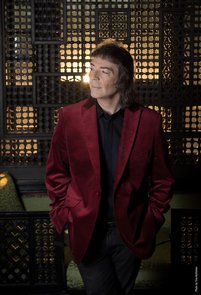
Of course, I can’t let Hackett go without asking him a little bit about Genesis. Knowing he was very young when he joined the group, I ask him whether there was a kind of 'sliding doors' moment where he could have taken another path, where everything that happened from thereon afterwards would have been completely different.
“I think when I was a kid about the age of 12 or 13/14, I got very interested in gymnastics and I didn’t weigh anything at that time, so I could do all sorts of things. I was in the school team and we took part in competitions and various things with schools in London and I had some idea that I might like to be a professional gymnast.”
I tell him that I definitely didn’t see that reply coming and he responds, “I know, but luckily I think I made the right choice because I think a gymnast’s years are probably limited. Whereas my fingers are still working and I wouldn’t dream of throwing myself around, doing what I did then.”
Thank goodness! Gymnastics loss has most certainly been music’s gain, although I imagine that keeping fit must be something that Hackett has to think about when he’s going on the road.
“Or trying not to get unfit, which is more like it.” Hackett replies. “I mean, I do exercise when I can but it is a busy schedule and so you do have to be realistic about this sort of stuff. ‘There’s a lot of hanging around,’ as Charlie Watts says, and an awful lot of driving and an awful lot of sitting down that goes on in order to get from A to B.”
“I think when I was a kid about the age of 12 or 13/14, I got very interested in gymnastics and I didn’t weigh anything at that time, so I could do all sorts of things. I was in the school team and we took part in competitions and various things with schools in London and I had some idea that I might like to be a professional gymnast.”
I tell him that I definitely didn’t see that reply coming and he responds, “I know, but luckily I think I made the right choice because I think a gymnast’s years are probably limited. Whereas my fingers are still working and I wouldn’t dream of throwing myself around, doing what I did then.”
Thank goodness! Gymnastics loss has most certainly been music’s gain, although I imagine that keeping fit must be something that Hackett has to think about when he’s going on the road.
“Or trying not to get unfit, which is more like it.” Hackett replies. “I mean, I do exercise when I can but it is a busy schedule and so you do have to be realistic about this sort of stuff. ‘There’s a lot of hanging around,’ as Charlie Watts says, and an awful lot of driving and an awful lot of sitting down that goes on in order to get from A to B.”
Going back to his time in Genesis, I wonder who was the person that Hackett connected to the most?
“Well, I think that I connected with them all in the time we were working together, but I have got a soft spot for Peter Gabriel. He was the guy who phoned me up originally and wanted to get me in the band and I think that he thinks about other people. He’s concerned; he’s a great humanitarian; I think he’s compassionate and inventive and he’s a very sweet guy - doesn’t mean he’s not determined - but he’s very sweet.”
Are they still in touch?
“Yeah, I still see him from time to time, it’s always lovely when I get to see him. He knows I love him and I think we like to see each other. We treat each other well, genuinely. We’re not competitive with each other. There were some great people in that band and he was one of them.”
I wonder if there’s anyone else Hackett would like to team up with in future, having performed with so many talented musicians in the past and he replies instantly, “Yes, I haven’t done anything with Buffy Sainte-Marie and I keep thinking it would be lovely to do something with her at some point because I think she was, and is and remains, a great prevailer of different types of songs, including protest songs. She wrote a number of things which were very, very moving. Universal Soldier, I think, is head and shoulders above the rest. I know Donovan covered that song but she wrote other songs that became possibly more well known than that. Elvis covered her stuff amongst tons of others and she wrote part of the music for Officer and a Gentlemen as well, so a very clever writer.”
Of all the music Hackett has written, what is he most proud of or would he call his greatest achievement?
“Well probably, [pauses for a bit] this is slightly complicated, but John Lennon said that Genesis was one of the bands he was listening to when we did Selling England by the Pound in 1973 and I remember seeing him on tv with Yehudi Menuhin, the violinist, and they were both having an argument about something. Then Yehudi Menuhin in later years did a programme and it was called from Kew to Findhorn, it was a programme back then about British gardens and all the music used on it were classical pieces but he used a piece of mine on that. So while two guys who were on opposite sides of the divide were arguing, I had their ear for at least 5 seconds. So that’s my proudest achievement because I’ve got enormous respect for both of them.”
“Well, I think that I connected with them all in the time we were working together, but I have got a soft spot for Peter Gabriel. He was the guy who phoned me up originally and wanted to get me in the band and I think that he thinks about other people. He’s concerned; he’s a great humanitarian; I think he’s compassionate and inventive and he’s a very sweet guy - doesn’t mean he’s not determined - but he’s very sweet.”
Are they still in touch?
“Yeah, I still see him from time to time, it’s always lovely when I get to see him. He knows I love him and I think we like to see each other. We treat each other well, genuinely. We’re not competitive with each other. There were some great people in that band and he was one of them.”
I wonder if there’s anyone else Hackett would like to team up with in future, having performed with so many talented musicians in the past and he replies instantly, “Yes, I haven’t done anything with Buffy Sainte-Marie and I keep thinking it would be lovely to do something with her at some point because I think she was, and is and remains, a great prevailer of different types of songs, including protest songs. She wrote a number of things which were very, very moving. Universal Soldier, I think, is head and shoulders above the rest. I know Donovan covered that song but she wrote other songs that became possibly more well known than that. Elvis covered her stuff amongst tons of others and she wrote part of the music for Officer and a Gentlemen as well, so a very clever writer.”
Of all the music Hackett has written, what is he most proud of or would he call his greatest achievement?
“Well probably, [pauses for a bit] this is slightly complicated, but John Lennon said that Genesis was one of the bands he was listening to when we did Selling England by the Pound in 1973 and I remember seeing him on tv with Yehudi Menuhin, the violinist, and they were both having an argument about something. Then Yehudi Menuhin in later years did a programme and it was called from Kew to Findhorn, it was a programme back then about British gardens and all the music used on it were classical pieces but he used a piece of mine on that. So while two guys who were on opposite sides of the divide were arguing, I had their ear for at least 5 seconds. So that’s my proudest achievement because I’ve got enormous respect for both of them.”
Hackett is really looking forward to coming to Southend having played at the Cliffs Pavilion many times before and also having visited Southend frequently as a child.
“Southend’s great and it’s changed and become hip. It’s got some lovely little restaurants. It’s great, marvellous.”
“I had some sweet, happy days coming to Southend with my grandmother and her second husband, I’ve always got a soft spot for Southend - can’t forget those wonderful memories there.”
No doubt Hackett will be making even more wonderful memories for old and new fans alike, when the Genesis Revisited with Hackett Classics Tour comes to the Cliffs Pavilion on the 10th May.
For more information on Steve Hackett, the Cliffs Pavilion gig and tour dates, click here!
Website: www.hackettsongs.com
facebook.com/stevehackettofficial
For tickets go online to www.southendtheatres.org.uk or call the box office on 01702 351135
All Photo Credits: Tina Korhonen
“Southend’s great and it’s changed and become hip. It’s got some lovely little restaurants. It’s great, marvellous.”
“I had some sweet, happy days coming to Southend with my grandmother and her second husband, I’ve always got a soft spot for Southend - can’t forget those wonderful memories there.”
No doubt Hackett will be making even more wonderful memories for old and new fans alike, when the Genesis Revisited with Hackett Classics Tour comes to the Cliffs Pavilion on the 10th May.
For more information on Steve Hackett, the Cliffs Pavilion gig and tour dates, click here!
Website: www.hackettsongs.com
facebook.com/stevehackettofficial
For tickets go online to www.southendtheatres.org.uk or call the box office on 01702 351135
All Photo Credits: Tina Korhonen
